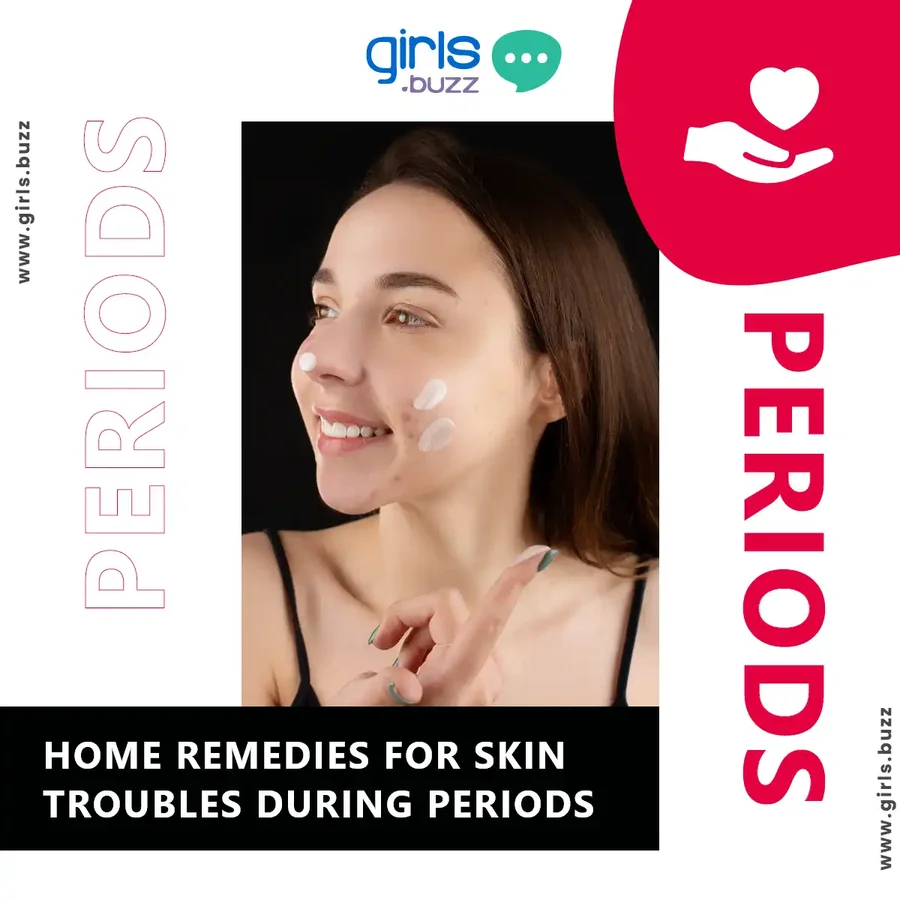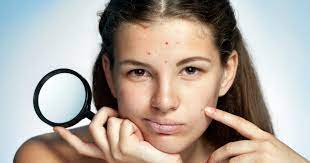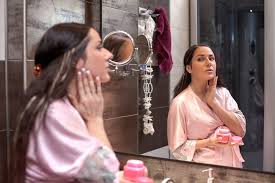Skin troubles during periods? Home remedies for it
5 minuteRead

By Samyati Mohanty
During most women's monthly periods, their skin goes through phases of dryness and oiliness. The skin can be the most troublesome during your period and the days leading up to it. This is when you might expect pimples and acne during periods. All of this is caused by a buildup of sebum beneath the skin's surface, which gives the impression of oily skin.
If you've ever wondered which hormone causes oily skin, the answer is that it's a combination of hormones. Hormone imbalances, such as progesterone, estrogen, and testosterone, alter the natural oiliness of your skin and the look of dry skin.
During the menstrual cycle, estrogen reaches a peak and a trough. It affects the skin's texture and thickness, as well as structural integrity and fluid balance, causing alterations. Acne during periods is caused by changes in hormone levels, and progesterone plays a key part in this. By closing skin pores and generating a buildup of sebum beneath the skin's surface, progesterone promotes breakouts.
Home remedies for pimples during periods and other skin problems during periods, that might work,
- Hormone levels such as estrogen and progesterone are low during the initial days of your cycle.This causes skin to become dry and lifeless, which can exaggerate lines and wrinkles. Moisturizing and hydration can be wonderful skin enhancers during the first few days of your cycle. Keeping your period clean will also help protect your skin from bacteria and illnesses.
Remedies
Going to a dermatologist or a skin care specialist is your best bet if you have hormonal skin disorders. They'll assist you in determining the best skincare routine and products for you to get healthy, glowing skin. Here are some of the best ways to maintain your skin healthy during the menstrual cycle's most difficult times:
- You should wash your face twice a day. Even if you don't use facial cleansers on a daily basis, give it a shot during your period. During your period, hormonal changes might cause your sebaceous glands to go crazy. Sebaceous glands make sebum, which is a type of natural oil. As your skin becomes oilier, it may require further assistance to clear excess sebum. This can help prevent pimples and menstrual acne during periods.
- Medications and vitamins should be used. A vast spectrum of illnesses and disorders are influenced by the menstrual cycle. These illnesses can cause serious skin problems during periods like cystic acne during periods and scarring. A health care practitioner can prescribe numerous sorts of drugs to treat these concerns. To relieve menstrual bloating, stomach pain during periods, and skin disorders, you could receive hormonal therapy or take particular supplements. Natural cures are acceptable as long as they are not used in place of medical care.
- Eliminating sugars and carbohydrates from your diet will aid in the prevention of breakouts.
- Find the goods that are most beneficial to you. For some people, cleaning wipes are a convenient solution. Others swear by a quick dab of blotting paper. Most people benefit from moisturizers and other treatments that nourish the skin, remove excess oils, and keep pores clear.
- Take advantage of face treatments. A cosmetician can help with skin problems during periods caused by the menstrual cycle by recommending treatments, masks, massages, and other solutions.
- Estrogen levels gradually rise throughout the follicular phase, which lasts for the first 10 to 16 days of your menstrual cycle. Your skin will most likely be at its best, with little to no inflammation. Because your serotonin levels are higher, you may feel happier. Your skin produces more natural moisture and collagen, making it stronger and more elastic.
Remedies
During the follicular period, your skin may be at its best. This means that cleaning and applying a mild moisturizer should suffice to suit your skin's needs.
- On day 14 of your cycle, you should expect to ovulate. Over the next five days, your skin will most likely appear clear and bright as testosterone and estrogen levels drop.
At that point, your progesterone levels will start to rise, resulting in oilier skin. Estrogen is recognised for giving the complexion a healthy shine, and it peaks around the time of ovulation. Increased luteinizing hormone levels can make you more prone to bacterial overgrowth on your skin. Avoid going to bed with makeup on during the ovulation time and pay additional attention to handwashing cleanliness to avoid transmitting bacteria to your face. acne during periods may increase because of this.
Remedies
- Use a skin care product that is oil-free.
- Face mists, sprays, light tonics, and micellar water are examples of light, water-based products as period pimples solution.
- Avoid pore-clogging products.
- Premenstrual symptoms can induce skin changes, as well as unhealthy food cravings and irritability. Some people are unaffected by hormone swings during the menstrual cycle, while others must adjust their schedules and habits to accommodate their periods.
Hormonal imbalances occur before, during, and a few days after a period, causing all of these significant changes.
Remedies
Once ovulation occurs, the luteal phase begins in the second part of your cycle. Here are some luteal phase skin care suggestions:
- Avoid processed and salty foods and snacks, as they will increase bloating, dry up your skin, and exacerbate breakouts. Also, refrain from touching your face and picking at blackheads, whiteheads, acne during periods, or any other skin irritation.
- Premenstrual symptoms include nervousness, increased hunger, bloating, and breakouts, particularly on the chin and around the nose. It's recommended to stay away from heavy makeup during this time.
- Pay special attention to skin washing.
- Concentrate on anti-acne during periods skin care products.
- Sugar and caffeine should be avoided as much as possible.
- If at all possible, avoid wearing makeup.
- If you must wear makeup, strive for a lighter, more natural look and avoid heavy foundations.
Summing up
Your menstrual cycle has an impact on your general mood, energy levels, and hair and skin quality. It's not uncommon to get unwell during your period. During the month leading up to menstruation, your entire body adjusts its hormone levels to develop a new egg as it prepares for prospective conception.
Your skin may become drier or oilier as a result of these physical and physiological changes. Estrogen, progesterone, and testosterone levels fluctuate, causing these alterations. Despite strong hormonal changes, learning to alter your food and skin care routines, and follow the listed ways to know how to avoid acne during periods naturally which can ultimately help you keep your skin in fantastic shape.
Write, Record and Answer! Consume Unlimited Content! All you need to do is sign in and its absolutely free!
Continue with one click!!By signing up, you agree to our Terms and Conditions and Privacy Policy.
















